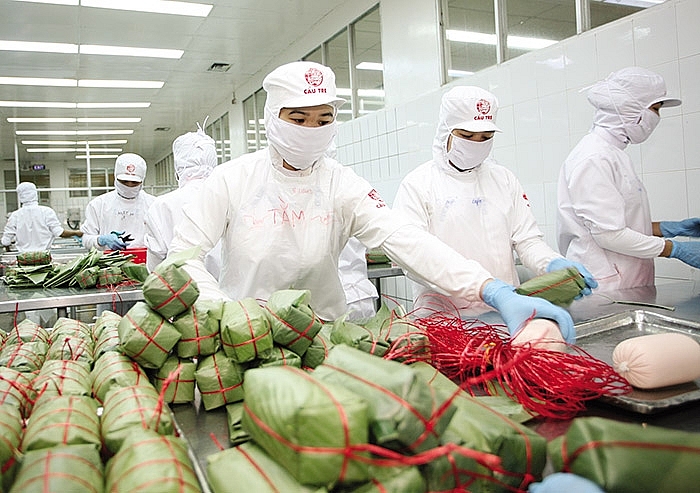Korean investors on M&A offensive
 |
| Mergers and acquisitions propagate more long-term partnerships for all involved, Photo: Le Toan |
Last week, VinaCapital became the latest financial firm to strike a deal with a South Korean asset manager, continuing the slew of such partnerships in recent years.
As part of this deal, VinaCapital and Kiwoom, which manages $40 billion of assets, will design new products that cater to South Korean investors in Vietnam and vice versa. Kiwoom’s Vietnam office, which opened last year, is also the first branch in Southeast Asia for the fund.
Nguyen Thi Thai Thuan, CEO of VinaCapital Asset Management, said that the firm is “very excited about the growing interest from South Korea.” According to her, the two parties will work to develop a multi-asset fund, an index fund or a real estate fund in both nations.
Just over a year ago, South Korean conglomerate Samsung Securities acquired 10 per cent of the stake in Dragon Capital, the largest overseas investor in Vietnam with more than $1.3 billion of assets under management. Following the deal, Samsung appointed one representative to Dragon Capital’s Management Board.
Other segments such as insurance, consumer finance and stock brokerage are also witnessing a slew of strategic handshakes from the two countries. For instance, late last year, VietinBank sold 25 per cent stake of its insurance arm to Hyundai Marine & Fire Insurance, the second-largest insurer in South Korea.
Lotte Finance introduced its first consumer finance product after buying out Techcombank Finance, and KB Securities launched a new branch following a takeover of Maritime Securities.
In an interview with VIR, Dragon Capital executive chairman Dominic Scriven noted that after years of direct investments in Vietnam in the form of factories and manufacturing plants, South Korean investors are now looking into Vietnam’s financial markets as a form of indirect investment. This includes partnerships with Vietnamese-based financial institutions like Dragon Capital.
“This is the logical next step for overseas investors and for Vietnam’s development path. Direct capital often comes first, thanks to Vietnam’s low labour costs and vast natural resources, followed by indirect investments into the Vietnamese financial markets,” Scriven said. “The next step is mergers and acquisitions (M&A) with domestic businesses, which signals confidence in the Vietnamese market because this tends to be a long-term partnership.”
The trend is amplified thanks to the New Southern Policy announced by the South Korean government in 2017. The policy aims to promote partnerships within Southeast Asia, including trade, investment, and M&A.
Companies are also tempted by Vietnam’s fast-growing economy, which expanded by 7.08 per cent in 2018 compared to the lacklustre 2.8 per cent of South Korea. Their brands in general are viewed favourably by Vietnamese consumers, thanks to their affordability and trendy designs.
Strong business ties between the two mean that financial businesses from both sides have great opportunities for growth and collaboration, ranging from transactions, foreign exchange, and investments to credit, insurance, and consumer finance. Instead of setting up their own subsidiary in Vietnam, many South Korean investors choose the M&A route.
For example, Shinhan Bank, which already has a wholly-owned subsidiary in Vietnam, still chose to buy the Vietnamese retail business of ANZ. After the buyout, Shinhan Vietnam is striving to boost its consumer finance business, leveraging the current consumer base and branch network of ANZ’s retail team in Vietnam.
Young-sup Joo, former Minister of Small- and Medium-Sized Enterprises and Startups in South Korea, expressed his belief that businesses there can share technologies with Vietnamese partners, and in return, the domestic partners can offer strong brand presence and a dominant market share in Vietnam.
The upcoming partnership between Vietnam’s BIDV and South Korea’s KEB Hana is one example. The $800 million investment from KEB Hana, in exchange for 17.65 per cent of the stakes, will help BIDV beef up its capital reserves and prepare for Basel II. The strategic partner is also expected to transfer technologies and provide market expansion for BIDV.
Kim Hyeong Soo, managing director of the South Korea Venture Capital Association, said that he has been busy organising meet-ups between businesses in different industries. According to him, M&A between the two countries are poised to grow in both quantity and quality, thanks to mutual interest and support from the two governments.
What the stars mean:
★ Poor ★ ★ Promising ★★★ Good ★★★★ Very good ★★★★★ Exceptional
Related Contents
Latest News
More News
- BJC to spend $723 million acquiring MM Mega Market Vietnam (January 22, 2026 | 20:29)
- NamiTech raises $4 million in funding (January 20, 2026 | 16:33)
- Livzon subsidiary seeks control of Imexpharm (January 17, 2026 | 15:54)
- Consumer deals drive Vietnam’s M&A rebound in December (January 16, 2026 | 16:08)
- Southeast Asia tech funding rebounds on late-stage deals (January 08, 2026 | 10:35)
- DKSH to acquire Vietnamese healthcare distributor Biomedic (December 24, 2025 | 15:46)
- Central Retail refocuses Vietnam strategy with Nguyen Kim exit (December 24, 2025 | 15:01)
- RongViet Securities wins sixth consecutive M&A advisory award (December 22, 2025 | 17:30)
- Kido Group divests from ice cream and frozen foods (December 18, 2025 | 16:49)
- Insurtech startup Saladin wraps up Series A funding round (December 17, 2025 | 09:10)

 Tag:
Tag:


















 Mobile Version
Mobile Version